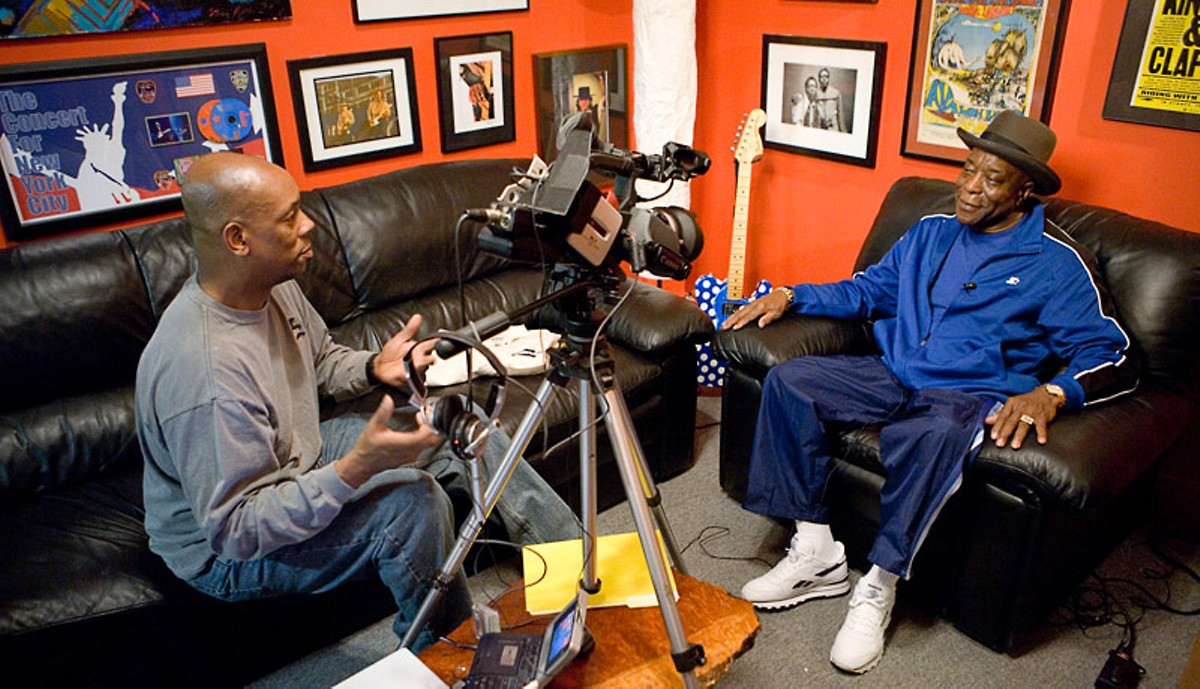Art Holliday is known for his work as a news anchor on KSDK-TV (Channel 5), but he's also an independent filmmaker in his free time. In his latest project, Johnnie Be Good, he documents the life and career of Johnnie Johnson, Chuck Berry's long-time piano player. While Holliday's received many local grants, he's also been hosting a series of fundraisers to support the project, which involves extensive travel for interviews. One of these fundraisers takes place at the Sheldon Concert Hall on Sunday, September 19. Dubbed "Johnnie's Jam: A Tribute to Johnnie Johnson," the show features Jimmy Vivino, Mike Merritt and James Wormworth. The three musicians, who also play in Conan O'Brien's band, were Johnson's "unofficial East Coast band," Holliday says.
Good is still very much a work in progress — the director himself isn't sure when it's going to be finished — but he recently discussed the project and his passion for music and film.
When did you first become interested in filmmaking?
Oh my. Actually I was interested when I was in high school, but I didn't really have any idea how to accomplish it. So I kinda took a little bit of a detour into broadcasting, which, thankfully, worked out well. Then I did my first documentary, Before They Fall Off the Cliff. I started that in probably 1997 and finished it probably around 2001, 2002. That was a documentary about the effect that schizophrenia had on a local family. And about the time I was finishing that documentary, a coworker of mine, Tony Chambers, one of our photographers at the TV station who is also a musician, was telling me about a friend of his who was producing a CD with Johnnie Johnson. So he was telling me that Johnnie was collaborating with Bonnie Raitt and John Sebastian and Johnny Rivers and Bruce Hornsby. And he knew I was a music fan, so we're just shooting the breeze in the newsroom. He was walking away from my desk, and he turned around, and he said, "I know you're into making documentaries. Johnnie Johnson might make an interesting documentary." And that's the idea that led to Johnnie Be Good for the last seven years.
You mentioned that your friend suggested you do a documentary on Johnnie Johnson. Why did you decide to pursue that story?
When you're trying to choose a subject for a documentary, you know that it's going to take anywhere from three to ten years of your life. So it'd better be something that is going to engage you over a relatively long period of time. And I'm a big music fan. When you look at Johnnie's story, there is St. Louis music history — [and] there's literally international music history, because the music that Chuck Berry and Johnnie Johnson collaborated on influenced the Beatles and the Rolling Stones.
On New Year's Eve in 1952, when [Johnnie's] sax player had a stroke, he needed an immediate replacement with a union card, and he called Chuck Berry. And that's one of the most famous phone calls in rock & roll. By telling Johnnie's story, it's the flip side of Chuck Berry's story, the story that Taylor Hackford dealt with in Hail! Hail! Rock 'n' Roll. Johnnie's side of the story is that he was always in the shadow of the band, he was never famous outside of the music industry. Most people, if you walk down the streets of St. Louis and said, "Do you know who Johnnie Johnson is?" probably seven, eight out of ten would look at you with a blank stare.
Now you ask the same people who Chuck Berry is, and they could give you at least some superficial answers. I mean, they could tell you about "Johnny B. Goode" or "Roll Over Beethoven." They could tell you something about who Chuck Berry is. And then there are other people who could tell you a lot about Chuck Berry, because he's an international icon. So I thought it would be interesting to compare and contrast their careers.
In terms of music, Chuck Berry and Johnnie Johnson were like Siamese twins. They were in each other's heads musically in a way that only a handful of artists are with their musical partners — Simon and Garfunkel, Mick Jagger and Keith Richards, Lennon and McCartney. In fact, Keith Richards, who was always the number-one interview that I needed for this film, in his autobiography, said that the songwriting team of Chuck Berry and Johnnie Johnson is the equal of Jagger/Richards and Lennon/McCartney.
Part of the controversy, if you will, or certainly part of the story is whether Johnnie should have received songwriting credits. And that's dealt with, along with many other aspects of Johnnie's life — his alcoholism, the way he's revered by musicians like Keith Richards and Eric Clapton and Bonnie Raitt and Paul Shaffer and on and on and on. There are many aspects of Johnnie's life that I deal with, not just his relationship with Chuck Berry. But certainly that's a central issue, the fact that they helped create rock & roll.
You mentioned his relationship with Chuck Berry and the songwriting credit issue. Have you interviewed Chuck Berry for the film?
No. About a year before Johnnie died, we had both gone to speak to Chuck, and the short version of the story is that he said he wanted script approval before he would have any further conversation. So that's the last time that I communicated with Chuck. And my plan is, because I'm actually editing now, I'm going to make another interview offer.
Honestly, I don't expect him to do an interview. That's his choice. Obviously it's not good for my film. I'd love to hear Chuck Berry talk about the way they created music. Chuck has one version; Johnnie has another version. It's the classic "he said/he said" situation. And in many ways it's a moot point, because Johnnie's not going to benefit. He's not with us anymore.
You know, Chuck powered over Johnnie in terms of international fame. But the fact that almost 50 years after that music was created, people are still debating it — I find that fascinating. It's a chance to put St. Louis back in the musical spotlight again and point out that not only did Chuck Berry and Johnnie Johnson heavily influence the genre that they chose, but Miles Davis was here at the same time, so was Ike Turner. The music that was created was timeless, and it was a very special time in St. Louis' music history. I want St. Louisans to pay more attention to their own musical history and point out to the rest of the world that, when it comes to some of the most important music that was ever created, a lot of it was created right here in St. Louis.






